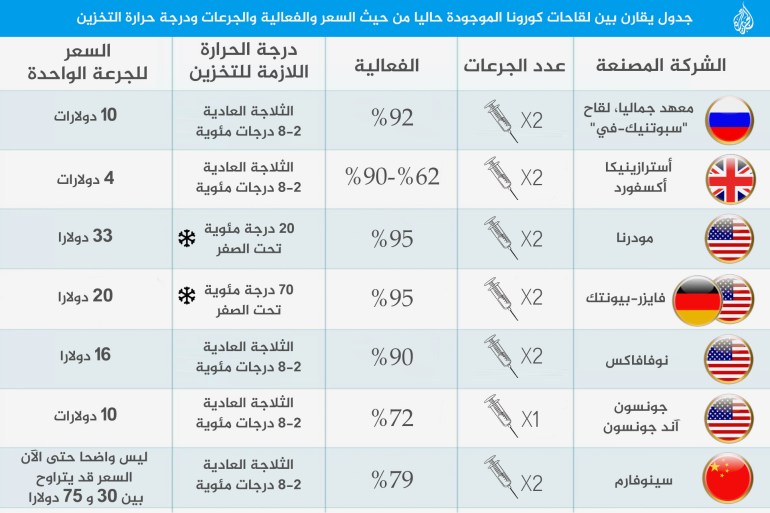A British study led by Oxford University found that the combination of two vaccines against the emerging coronavirus "Covid-19" led to an amazing result, so what are they?
And what is this result?
The study proved that the combination of the two anti-coronavirus “Oxford-AstraZeneca” and “Pfizer-BioNTech” vaccines led to a strong immune response, according to what was published by the Oxford University website.
The study was published in pre-print - that is, it has not been reviewed by peer researchers - in the Lancet medical journal.
The combination of the two vaccines generated a strong immune response against the spike protein in the coronavirus.
The strongest immune response was when the first dose was "Oxford-AstraZeneca" and then the second "Pfizer-Biontech" vaccine, and the time between the two doses was 4 weeks, and this led to high concentrations of antibodies against the spike protein.
Associate Professor of Pediatrics and Vaccines at Oxford University and lead researcher in the trial, Professor Matthew Snape, said that the study - called "Com-COV" (Com-COV) - evaluated mixing Oxford and Pfizer vaccines to see to what extent these vaccines can be used interchangeably, which may Flexibility is allowed in the UK and internationally.
The results show that when administered over a 4-week period, both combination regimens (i.e. the first dose of “Oxford-AstraZeneca” and then the second “Pfizer-Biontech” vaccine, and vice versa) lead to a higher immune response than the administration of the “Oxford-AstraZeneca” vaccine. As usual, that is, in two doses.
The researchers also reached the following results:
When the first dose was the Oxford-AstraZeneca vaccine and then the second Pfizer-Biontech vaccine, more antibodies and T-cell responses were stimulated than when the first dose was the Pfizer-Biontech vaccine and then the second Oxford-AstraZeneca vaccine.
Both of the previous regimens stimulated higher antibodies compared to giving two doses of the "Oxford-AstraZeneca" vaccine.
The highest antibody response was after receiving two doses of the Pfizer-Biontech vaccine.
Professor Snape said these results are invaluable evidence for the use of mixed doses, but the four-week interval studied here is shorter than the eight to 12-week schedule most commonly used in the Oxford-AstraZeneca vaccine, as this longer period is known to be Lead to a better immune response.
Snap added that the results of giving mixed vaccines will be available when the period between the first and second doses is 12 weeks, soon.
The results of the 12-week period, which are yet to be seen, will be instrumental in decisions about the future of the UK's vaccination programme.
A long interval between two doses of the "Oxford-AstraZeneca" vaccine improves its efficacy
We remain at Oxford University, where another study, whose results were published on Monday, revealed that a period of several months between the first and second doses of the “Oxford-AstraZeneca” vaccine against “Covid-19” improves the immunity that it secures, considering that it is a “reassuring” factor for countries facing problems. In obtaining the vaccine, the study was quoted by the French press agency.
The researchers showed that the time period of up to 45 weeks between the two doses improves the immune response to the virus, and does not reduce the effectiveness of the vaccine.
Professor Andrew Pollard, director of the Oxford Vaccine Group, which developed the Covid vaccine in collaboration with Swedish pharmaceutical group AstraZeneca, said: “This news should be reassuring for countries with lower vaccine volumes that may worry about delays in getting second doses to their populations. There is an excellent response to the second dose. Even 10 months after the first dose."
Last February, an Oxford University study published in The Lancet indicated that the effectiveness of the vaccine is greater with a 3-month difference between the two doses (81%) compared to a 6-week period (55%).
In their study published Monday, the researchers also confirmed that a third dose given more than 6 months after the second leads to a “significant increase” of antibodies and a “significant rise” in the immune response against “Covid-19”, including against mutated versions.
"It is not known whether additional injections are needed due to decreased immunity or to increase it against the mutated versions of concern," said Theresa Lampi, the lead author of these studies.
But Lambie stated that research shows that acceptance of a third dose of the vaccine "does well and significantly increases the antibody response. This is very encouraging news if we note that a third dose is needed."
The researchers noted that "the side effects of the vaccine were less after the second and third doses than after the first dose."
The AstraZeneca vaccine, which adopts the so-called “viral vector” technology, caused great concern after proving a link between the vaccine and very rare but often fatal blood clots, and therefore many countries recommended its use exclusively for the elderly, while other countries suspended its use completely.

